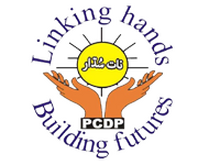Vision
“To see an empowered Parkari community; literate, healthy, self-reliant, socially integrated, and free from socio-economic oppression”. PCDP mainly focuses on women and children. It has a strong emphasis on community-owned schools which develop mother tongue literacy and numeracy materials to enable children to transfer their learnt skills into provincial, national and international languages. PCDP realizes its vision through implementation of field based programmes in cooperation with Parkari village communities.
Mission
“To raise awareness of civil and human rights and to implement appropriate projects for the promotion of mother tongue based Multilingual education and community development, using a participatory approach which promotes family welfare and self-reliance among the community”.
Goal
"To reduce poverty and facilitate sustainable development through a combination of targeted programmes, to promote self-help activities, to improve the livelihood of the community and to empower the Parkari community through skills training and community involvement”.
History
The Parkari Community Development Programme (PCDP) was founded in 1996 by a young Parkari man Mr. Poonam Paschal, in collaboration with Mr. Richard Hoyle, a British national. The development of Parkari as a written language with a standard orthography began in 1983 when the Parkari Language Committee was formed to decide how Parkari should be written and what kinds of literature should be produced. Mr. Sajjan Parmar was chairman of this committee and he also produced a hand written magazine in Parkari called “Prem Parchar”. In 1985, the first Parkari books were produced by Richard, Poonam and other Parkaris. By 1995 there was already a lot of reading material produced about health, education, religious topics and general knowledge, but very few people were able to read Parkari. Thus, distributing literacy materials throughout the Parkari community became a major focus. The script used for writing Parkari is based on the script used for Sindhi, the main regional language. So, if a Parkari can read Sindhi, it is easy for them to read their own language. With the literacy rate for the Parkari community being only about 2%, the production of audio cassettes based on available literacy materials began in 1996. Mr. Jokim Hamdam, a Parkari man with experience in producing drama and audio recordings from his time at a local Audio Visual Centre, was hired to facilitate this. Thus, the Parkari Audio Visual Project (PAV) was started in 1996. Later, in 1999, PAV evolved into the Parkari Community Development Programme (PCDP). In 2003, according to the regulations of the societies Act XXI of 1860, PCDP was registered as a society, number 4101. Originally the main idea was that PCDP would promote awareness amongst the Parkari community about the printed and audio materials now available in their own language. However, PCDP developed into something far wider, and began to encourage an awareness of social development throughout the Parkari community on a non-religious, non-political and non-profit basis. Education was the first social development initiative. Until 1999, even though there were printed and audio materials available for starting literacy classes, a lack of trained literacy personnel made this very difficult. However, there was an answer to prayer when Canadians Steve and Vicky Simpson, who were very experienced in the area of Multilingual Education (MLE), came to help. After visiting a few literacy projects in Pakistan they decided to work with the Parkari literacy project (PLP). Initially, one MLE pilot project was started. Then in 2000, after the 1st MLE project seemed successful, five more MLE schools were started in the Barrage areas of Matli, Naukot and Khipro. At this time, Parkari MLE schools were unique in the region, with children starting their education in their own language before learning languages of wider communication. MLE made it easier for pupils to read, write and understand the curriculum. This also created a strong interest among the Parkari community as to how education can be the key to a brighter and more promising future. Since 1999, PCDP has also worked in the field of community development among the Parkari community, one of the most under privileged and marginalized group in the Lower Sindh, and responded in many ways to the Parkari community’s numerous felt needs.
Logo & Slogan
The logo of open hands holding the sun with the slogan Linking hands - Building futuresrepresents PCDP's vision, mission and goals. This logo and slogan emphasizes that PCDP is joining hands with the Parkari community to give support and as an organization, PCDP strives to build a better future for the Parkari community through working with them in close cooperation, as represented by the bright sun.
